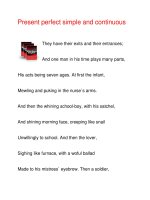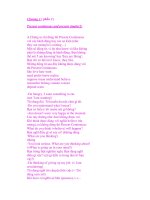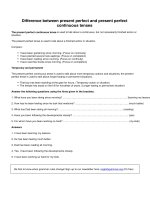5460 present simple and present continuous tenses
Bạn đang xem bản rút gọn của tài liệu. Xem và tải ngay bản đầy đủ của tài liệu tại đây (352.12 KB, 5 trang )
We use THE PRESENT SIMPLE:
-
-
-
-
-
to express habitual actions/
routines
I do the shopping on Fridays.
to express general facts in the
present that are permanent
I work in a bank.
to express general truths
The sun sets in the west
with certain time
expressions/adverbs of
frequency
always, usually, often sometimes,
occasionally, rarely/seldom, never
Note that if you would like to
express your anger or
annoyance you use the Present
Continuous with the time adverb
’always’
E.g. You are always losing your
keys! How careless you are!
with the verbs of the senses
feel , hear, see, smell, taste
with verbs expressing like or dislike
and other emotions
love, like, dislike, hate, want, need,
prefer, care etc.
With verbs that express possession,
thought, belief, knowledge
own, owe, have, think, believe, know
We use THE PRESENT
CONTINUOUS:
-
-
-
-
to express actions or events that
are happening now
Can you call me back later, I am
working right now.
to express planned actions in the
near future
We are having a party tonight, would
like to join us?
to express gradual changes
The weather is getting colder and
colder.
with certain time expressions
now, at the moment, today, these
days, this week etc.
Formation of the Present
Fromation of the Present
Simple
Continuous
Affirmative:
Affirmative:
We use the infinitive form of the
verb and add an ’s’ for the
third person singular:
We use the present form of the
auxiliary verb ’be’ + the
present participle that is the –
ing form of the verb
I always get up at 6 in the
morning.
He never helps me with the
housework.
Don’t disturb him, he is working
right now!
Short forms: I’m working
Note: Verbs ending in ss, sh, ch,
x and o have an ’es’ ending
instead of an ’s’
You’re working
Whenever he goes out with his
friends, he is late for school the
next day.
We’re working
She watches soap operas every
day, she is addicted to them.
Negative:
We use the auxiliary verb ’do’ +
not+ infinitive or ’does’ + not +
infinitive respectively.
I do not have any free time on
weekdays, I’m too busy.
He does not eat any meat.
Short forms:
do+not -> don’t
does+not -> doesn’t
Interrogative:
Do you work full time?
Does she visit you often?
He/She’s working
You’re working
They’re working
Negative:
We always negate the auxiliary
verb ’be’ and the present
participle remains the same.
She is not listening to the radio,
she is watchig TV.
Here we can also use
contractions:
She isn’t listening to the radio.
Interrogative:
The auxiliary verb ’be’ comes
before the subject.
Is the postman delivering the
letters today?
Try to imagine that you are well known reoprter of a famous magazine. You are
invited to the White House to make an interview with President Obama.
What are the ten most interesting questions you would ask him? Below you find
some words/phrases to help you. You do not need to use all of them, you may use
your own imagination. After writing down the questions, find a classmate who can
play the role of Mr. Obama and write down the answers, too.
spend, vacation, relax, do sports, do-it-yourself, parties, time on your own,
dance, raise children, outdoor hobbies etc.
1.
……………………………………………………………………………………………………………………………………………………………
…………………………………………………………………………………………………………………………………………………………..
2. ..
……………………………………………………………………………………………………………………………………………………………
……………………………………………………………………………………………….………………………………………………………..
3…………………………………………………………………………………………………………………………………………………………
…………………………………………………………………………………………………………………………………………………………..
4.
……………………………………………………………………………………………………………………………………………………………
……………………………………………………………………………………………………………………………………………………………
5.
……………………………………………………………………………………………………………………………………………………………
……………………………………………………………………………………………………………………………………………………………
6.
……………………………………………………………………………………………………………………………………………………………
……………………………………………………………………………………………………………………………………………………………
You can see five funny quotes from famous people. Try to match the two halves of
each quote.
’I’m an excellent housekeeper.
a, …sees the opportunity in every
difficulty.’ (Winston Churchill)
2. ’I am so clever that sometimes
b, …a good look at the insides of
my eyelids.’ (Jonathan Raban)
3.’ A pessimist sees the difficulty in every
opportunity, an optimist
c, …doesn’t mean all parachutes
are perfect.’ (Benny Hill)
4. ’Just because nobody complains
d, …Every time I get a divorce, I
keep the house.’ (Zsa Zsa Gabor)
don’t understand
5. ’I am not sleeping. I am just taking
e, …I don’t understand a single
word of what I am saying.’
(OscarWilde)
2.’ I am so clever that sometimes
Complete the following jokes with the suitable verbs from the list. Use the
appropriate tense.
The little polar bear …………………….his
mother:’Mummy, am I a 100% polar bear?’
nHis mother ………………….: ’Of course, darling.
The bruin insists:’Are you sure, Mummy?’
int he back seat in the go
His mother answers:’Well, sweetheart, your
father’s mother is a 100% polar bear, your
father’s father is a 100% polar bear. Your
ox to her
mother’s mother is a 100% polar bear, your
mother’s father is 100% polar bear. Your
dad is 100% polar bear and I am a 100%
polar bear. That means you are a 100%
polar bear as well. ’But why …………………….?’
’Beacause I ……………………………..!!!!’
A family with three boys …………………….in a
traffic jam. As they ………………………….in the
car, the boys going mad in the back seat,
the wife sees a beautiful baby girl in a car
next to them. She says to her husband: ’As
soon as I gain back my ideal weight, we
should try and ……………………….a little
girl!’Her husband …………………………a boksz
and to her and says: ’Have some more
cookies, darling!’
go for, sit, hand over, get stuck
freeze, ask, reply, bother
A man …………………………….home from the
funeral of his mother-in-law. Suddenly, a
brick ………………………….right next to him
and almost ……………………..him on the
head. The man ………………… in the sky and
says: Dear Mama, are you up there so
quickly??!’
hurtle down, walk, look up, hit
An errant …………………………. in the forest
and he is very hungry. Suddenly, he
……………………sight of a hut. He ………………
there, ………………………on the door. An old
woman opens it and the man
………………………..that the old woman
………………………………..dinner. He asks her:
’May I have something to eat? I am
terribly hungry!’
’Would you accept some soup
from yesterday?’
’Of course! It would be just
great!’-says the errant.
’Then
……………………….tomorrow!’-replys the
woman.
cook, roam, catch, knock,
come back, see









